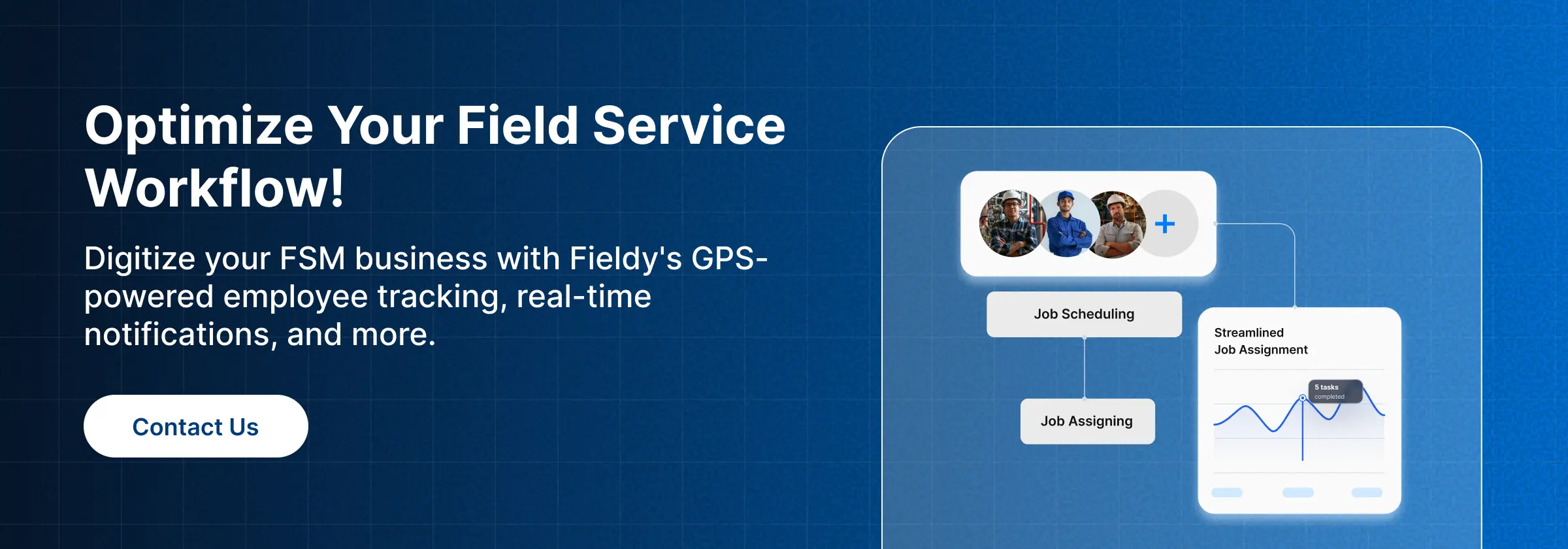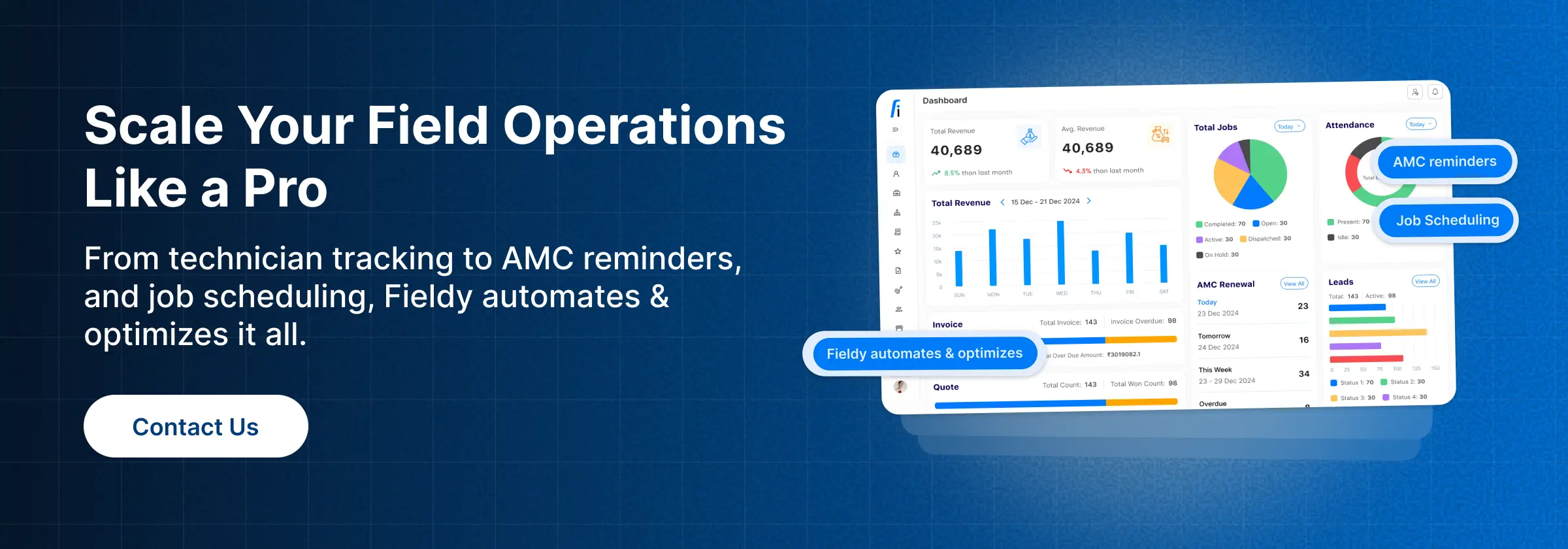Field service refers to work that takes place at the customer’s location rather than at the company’s headquarters or main office. What field service really means is the on-site delivery of services like installation, repair, maintenance, and customer support, typically handled by mobile employees or technicians. These professionals travel to the client’s location to ensure that systems or products function effectively, offering hands-on support exactly where it’s needed.
Here are the big four: HVAC, plumbing, IT support, and facility maintenance. Each of these industries depends on its practitioners to provide critical services right on the customer’s site.
Field service is the linchpin of service delivery in modern industries. Get more information about what a field-service technician does and discover how people energize this system every day.
What Are Field Service Operations?
Field service operations comprise the workflows and systems that help the field technician perform in the field. Generally, these include:
- Job scheduling and technician dispatching
- Route optimization via GPS
- Instant mobile access to work orders and parts inventories
- Real-time communication between field teams and customers
- Digital documentation and reporting
Such real-time coordination makes a major difference. The global field service management (FSM) market is expected to reach an OEM of $11.78 billion by 2030, growing at a CAGR of 13.3% from 2023–30. This only shows the rising demand for connected and streamlined field operations.
Key Aspects of Field Service
Work Order Management
Field service activities consist of structured job assignments. The work order management involves the creation of service requests, their assignment to specific service tasks, tracking their progress, and finally their closure-all in a smooth manner.
Example: The plumbing company receives a customer complaint and the technician is dispatched via a digital work order tracking system. The technician fixes the problem and updates the work order in real time.
Scheduling & Dispatching Technicians
Scheduling properly gets the right technician to the site on time. Real-time dispatching limits downtime and increases customer happiness.
Example: An HVAC company reroutes a technician to attend a high-priority customer call using smart scheduling features.
Inventory & Parts Management
Parts management assures that the technicians have what they need. Real-time inventory is good to avoid any delay or second visit.
Example: Before departing the warehouse, electricians check for tool and part availability via mobile systems.
Customer Communication
Field service hinges on communication. The tools provide for the transparency of communication, by means of real-time alerts, status updates, feedback forms.
Example: Customers receive SMS alerts when the technician is on the way and then an SMS review request after completed services.
Examples of Field Service in Action
Field service refers to the on-site work performed by technicians or specialists at customer locations rather than a central facility. Depending on the type of service, they help minimize downtime, ensure compliance, and satisfy customers.
Below are some real-life applications of field service operations in different industries:
- Installation and Commissioning of Equipment
The technicians are employed to visit customer sites to put systems such as HVAC, routers, or industrial machinery into operation.
- Example: An HVAC company dispatches a technician to a commercial building to install a central air conditioning system. The technician configures the thermostat setting and tests the airflow to ensure that the entire facility is adequately cooled.
- Preventive and Corrective Maintenance
Field technicians perform scheduled maintenance for equipment or fix faults to enhance life and defend against abnormal downtime.
- Example: A company for medical equipment would send technicians every quarter to service diagnostic machines in hospitals.
- Emergency Repairs
Technicians are dispatched with no further wait to attend to emergency matters affecting critical infrastructure or customer operations.
- Example: The elevator company will send a crew to fix a lift that is stuck between floors.
- Recalls and Field Service Campaigns
These actions are decided by manufacturers for product servicing or recall interventions that require an intervention in the field.
- Example: An automotive company issues a recall so that local dealers are authorized to replace defective airbags on the spot.
- Customer Support and Upgrade on Site
Technicians help out with on-site troubleshooting, user training, or software and hardware upgrades.
- Example: The utility company establishes on-site upgrades of fiber optic cables in residential areas to improve connectivity.
- Inspections and Compliance Checks
Routine inspections are conducted to adhere to regulatory and safety standards.
- Example: The solar provider carries out field inspections annually in order to ascertain that the panels satisfy output and compliance criteria.
- In-Home Healthcare Services
Healthcare professionals deliver medical care from the patient’s home.
- Example: Nurses perform routine field rounds, performing health checks and administering medications.
According to McKinsey, in-home healthcare services are forecasted to grow by 25% because of increased demand in patient-centric care.
- Asset Removal or Redeployment
Technicians perform removal or relocation of equipment upon service cessation or asset upgrade.
- Example: The telecom operator collects old modems from the customers who cancel their subscriptions to prepare them for recycling.
Examples Across Industries
| Industry | Field Service Example |
|---|---|
| HVAC | Emergency summer repairs using smart dispatch tools |
| Plumbing | Real-time response to pipe leaks and urgent maintenance |
| IT Services | On-site network setup and troubleshooting |
| Healthcare | In-home patient visits for medical support |
| Automotive | Field-based recall repairs through authorized service partners |
| Utilities | Power restoration and infrastructure upgrades |
| Telecommunications | Customer installation and service migrations |
| Solar/Energy | Annual inspections and compliance checks |
What is Field Service Management & How Does It Support Operations?
Field service management is a term used for the software and systems that companies put in place to manage field operations. FSM tools, therefore, centralize job tracking, technician scheduling, inventory, and customer communication in order to help businesses perform services quickly and on time.
Fieldy is a completely modern field service management software that automates processes and makes operations mobile. From assigning jobs to the final report, Fieldy reduces complexity and increases accountability.
Explore more about field service management and how it can revolutionize the working environment in the company.
What Kind of Companies Use Field Service Solutions?
HVAC
Tracking service jobs, dispatching teams, and recording seasonal demand require HVAC field service management software. FSM toolboxes also accommodate sergeant technicians in carrying out work efficiently during peak months.
Plumbing
In the plumbing and maintenance sectors, plumbing service software is used for scheduling emergency repairs, periodic maintenance tasks, and the creation of transparent service reports for all clients.
Security Systems
In security, companies use security management system software to schedule installations, monitor service alerts in real time, and issue audits of the systems on either a commercial or residential scale.
Home Improvement
Contractors and remodelers rely on premier home improvement software so they can efficiently juggle multiple job sites, client updates, and material deliveries.
Pest Control
Having pest control software installed on their mobile devices lets pest controllers register inspections, arrange treatments, and record compliance data from the field.
Elevator Management
As the elevator maintenance service provider, elevator maintenance software is used to track service contracts, job logs, and technician deployment across properties.
How Fieldy Helps Streamline Every Aspect of Field Service
Fieldy helps make service delivery easier with the ideal features for today’s mobile workforce:
- Technician Tracking: Integrated into the application, the technician tracking feature shows the real-time location of the technician and the progress of the job.
- Smart Scheduling: The built-in Field Service Scheduling Software handles the scheduling of jobs, assigning jobs on skills, location, and urgency.
- Real-Time Job Status: Being real-time employee tracking software, Fieldy gives visibility into job updates as they happen.
- Mobile-first Dashboard: Fieldy provides a fully responsive field service management application that allows technicians to receive work orders, upload job data, and close tickets all through their mobile devices.
Conclusion: Why Understanding Field Service Matters for Modern Businesses?
Field service forms the backbone of on-site support across industries. From schedule-making, inventorying, to technician dispatch and customer engagements, the more efficient the field service, the greater the chances for customer satisfaction and operational success.
Companies that invest in smart tools such as Fieldy find themselves having a competitive advantage in automation, insight, and agility.
Are you ready to give your field service operations a second breath? Try Fieldy now by booking a free demo.




